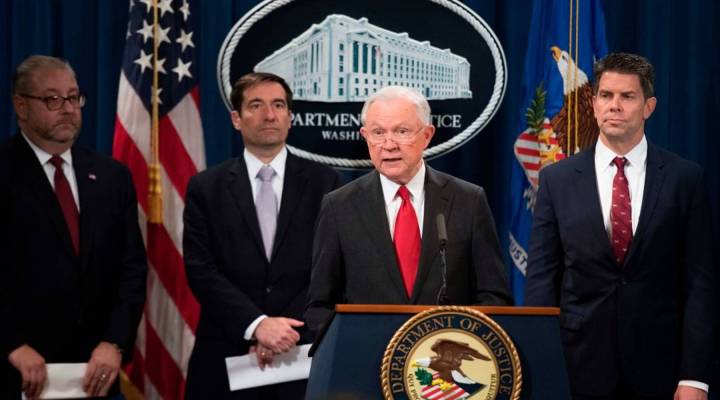
DOJ lawsuit part of bigger tech crackdown on China

Micron Technology makes memory chips for electronics including smartphones. The semiconductor company, like many stateside tech firms, relies heavily on Chinese manufacturers. But the dependence comes with a risk, it makes their intellectual property and trade secrets vulnerable to theft by Chinese companies. Yesterday, Attorney General Jeff Sessions announced the indictment of three former employees of Micron, as well as Fujian Jinhua Integrated Circuit, a Chinese state-owned company and a Taiwanese semiconductor company, United Microelectronics Corp., on charges of conspiring to steel technology from Micron.
Jim Lewis at the Center for Strategic and International Studies says this is emblematic of the dilemma facing U.S. tech companies.
“How do we work with Chinese companies in a way that doesn’t end up selling them the rope we would use to hang ourselves?” he said.
The Trump administration’s broad answer includes the crackdown on intellectual property theft, tariffs, limits on U.S. tech exports to China, and restrictions on visas for tech workers and students.
“The goal is really to disentangle the U.S. economy from the Chinese economy,” said Susan Shirk who chairs the 21st Century China Center at UC San Diego. She thinks the strategy is too heavy-handed. Tech companies are also conflicted. They want protection for their intellectual property, while criticizing tariffs for disrupting their business.
There’s a lot happening in the world. Through it all, Marketplace is here for you.
You rely on Marketplace to break down the world’s events and tell you how it affects you in a fact-based, approachable way. We rely on your financial support to keep making that possible.
Your donation today powers the independent journalism that you rely on. For just $5/month, you can help sustain Marketplace so we can keep reporting on the things that matter to you.


















